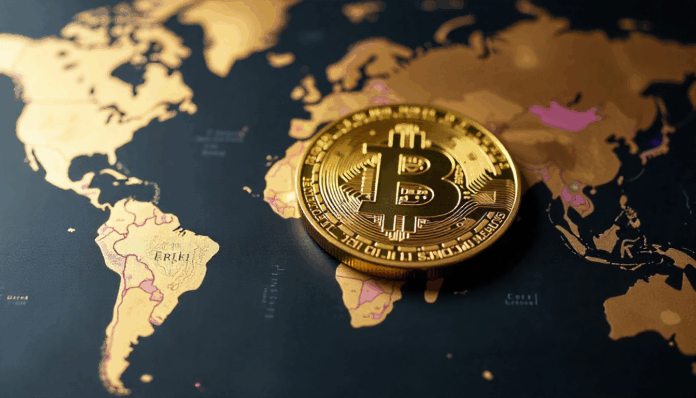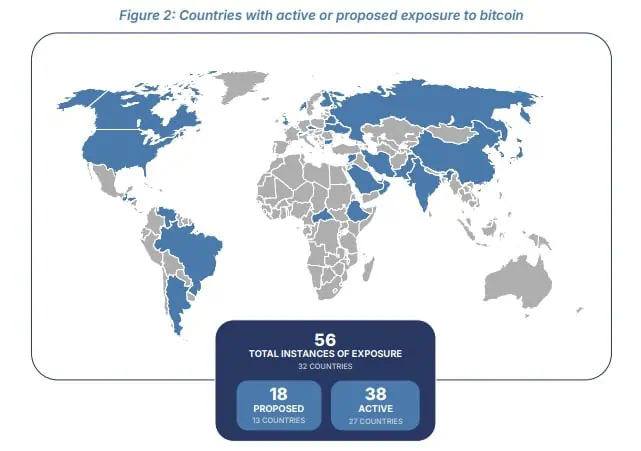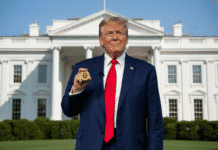
Bitcoin is consolidating its position as a strategic global asset. Twenty-seven countries now incorporate BTC into their reserves, driving a new era of state and financial crypto adoption.
In recent years, Bitcoin has transitioned from a primarily speculative asset to a key component of the financial and reserve strategies of several states around the world.
According to the report “Nation State Adoption: How and why countries are gaining exposure to Bitcoin”, published by the Bitcoin Policy Institute, there are now 27 countries—approximately one in seven—that have some level of exposure to the market-leading cryptocurrency. Additionally, 13 nations have introduced legislative proposals to formally advance its adoption as sovereign asset.
According to the report, this dynamic of government adoption is favoring a geopolitical race for the early incorporation of Bitcoin, in which powers of America, Europe, Asia and the Middle East They compete to position themselves in a scenario that expands the boundaries of state financial policy.
HODL Bitcoin, like 27 other countries. Visit Bit2Me.More than a cryptocurrency: Bitcoin as a macroeconomic asset
Historically, Bitcoin started as a cryptocurrency used between groups cypherpunks interested in privacy and decentralization. Its use later became popular among retail users and speculators, before attracting hundreds of businesses, corporations, hedge funds, and more. Now, the evolution of this cryptocurrency is manifested in the entry of national governments into its ecosystem.
The current market is no longer limited to recognizing Bitcoin as just another currency, but states are beginning to incorporate it into their portfolios as a macroeconomic asset with unique characteristics.
The United States is currently one of the most prominent examples of this evolution. In the past, the country's authorities only held bitcoins because they were seized in federal investigations. However, an executive order signed by President Donald Trump in March of this year instituted the use of Bitcoin as a strategic asset and established a framework for its retention as a sovereign store of value.
Senator Cynthia Lummis has moved forward with a proposal for the United States to acquire one million BTC as part of its national reserve, an initiative that has received significant state support in states such as Arizona, New Hampshire, and Texas through the passage of the “Strategic Bitcoin Reserves” (SBRs) in those jurisdictions.
The United States' interest in using Bitcoin as a store of value, and its commitment to not sell its current cryptocurrency units, has generated a ripple effect, as at least 13 countries have introduced similar legislation to recognize Bitcoin as a sovereign asset, and several cities have begun accepting tax payments in this cryptocurrency.

Source: The Policy Institute
New forms of Bitcoin investment transform public finance
El report The document in question highlights several elements that characterize countries that own Bitcoins. On the one hand, it indicates that the methods by which states are exposed to this cryptocurrency show a wide range of innovations.
In addition to direct purchase and sovereign custody, Countries are investing in sovereign wealth funds (SWFs) that acquire BTC or participate in ETFs and shares of companies with a strong presence in Bitcoin, as Strategy.
Furthermore, the state mining emerges as another way, where the harnessing surplus energy to mine bitcoins It is often carried out in partnership with foreign companies, as is the case in Bhutan. At the same time, pension funds and central banks are beginning to incorporate exposure to digital assets into their financial strategies.
The strategic benefits of this diversification relate to the intrinsic properties of Bitcoin. Often considered as “digital gold”Bitcoin offers portability, global liquidity, and a fixed supply, reinforcing its appeal as a complement to traditional gold reserves.
On the other hand, its use in the issuance of financial instruments, such as sovereign bonds partially backed by BTC —called “Bit-Bonds”—, opens up opportunities to reduce national financing costs. Bitcoin technology, especially the network Lightning Network, also acts as a regional trade facilitator, simplifying and reducing the cost of transactions by reducing foreign exchange intermediation.
Finally, countries that are early adopters of Bitcoin tend to attract cryptocurrency-related businesses, boosting local entrepreneurship and financial innovation.
Create your account and manage BTC with strategic visionEl Salvador and the keys to state adoption of Bitcoin
El Salvador and the Central African Republic have achieved milestones in the state-level use of Bitcoin, providing valuable lessons about the challenges and opportunities this financial innovation presents.
In 2021, El Salvador was the first country to incorporate Bitcoin as legal tender., a move that defied the traditional recommendations of international organizations like the International Monetary Fund (IMF). Although the law was amended in 2025 to eliminate the requirement for merchants to accept BTC, the country has accumulated a sovereign reserve of approximately 6.330 BTC, equivalent to more than 1% of its GDP, which has appreciated by 130%.
Another country that followed El Salvador's example was the Central African Republic, which adopted Bitcoin as legal tender in 2022, although it had to reverse the move within a year, primarily due to infrastructure-related limitations.
Both experiences reflect that the incorporation of Bitcoin by a State goes beyond decreeing its use. It is essential to have a solid foundation for managing this cryptocurrency, transforming it into a strategic asset.
Along these lines, the policies being developed in the United States seek precisely to establish Bitcoin as a national store of value, making purchases budget-friendly and encouraging its integration into the country's financial portfolio. The Trump administration also recognizes the importance of not selling Bitcoin prematurely, as has happened in the past.
Trade BTC on Bit2Me, your gateway to the financial future.A shift in the global narrative
The Bitcoin Policy Institute report positions Bitcoin as a new macroeconomic asset that states are incorporating into their reserves and financial strategies. The dominant narrative has shifted from focusing on whether Bitcoin can be used to pay for goods and services on a daily basis, to recognizing its role as a reserve asset and strategic tool which provides economic resilience, innovation and institutional attractiveness.
Experts point out that this adoption is no longer anecdotal, but rather a consolidated trend involving nearly 15% of countries. Furthermore, the speed of its integration suggests that Bitcoin could emerge as a third pillar in the global reserve system., along with gold and Treasury bonds, with a growing influence on the global monetary reconfiguration.
According to the report, governments that act early will gain advantages in diversification, financing and the ability to attract investment, positioning themselves as financial innovation hubsThe competition to incorporate Bitcoin is presented as a global race, where time plays a determining role in the strategic benefits that can be obtained.
This transition entails a transformation in the way nations manage their assets, incorporating the leading cryptocurrency not only from a financial perspective, but also as a flexible tool to facilitate trade and stimulate local economic ecosystems. The experience accumulated to date shows that the recognition of Bitcoin by authorities goes far beyond its recognition as legal tender and extends to a multitude of exposure options and specific programs, with lasting impacts on national economies.
Create your account and start holding BTC with one clickIn conclusion, the integration of Bitcoin into the national reserves of 27 countries marks an evolution in how states manage their financial assets and prepare for scenarios of economic change.
According to the Bitcoin Policy Institute's analysis, this trend presents a new strategic dimension for digital currency: consolidation as a global reserve asset that drives financial innovation, economic diversification, and geopolitical competitiveness.

Bitcoin 101 Course
Medium levelIn Bit101Me Academy's Bitcoin 2 Course you can continue your crypto education and learn what Bitcoin is, where it comes from and how to obtain it.


